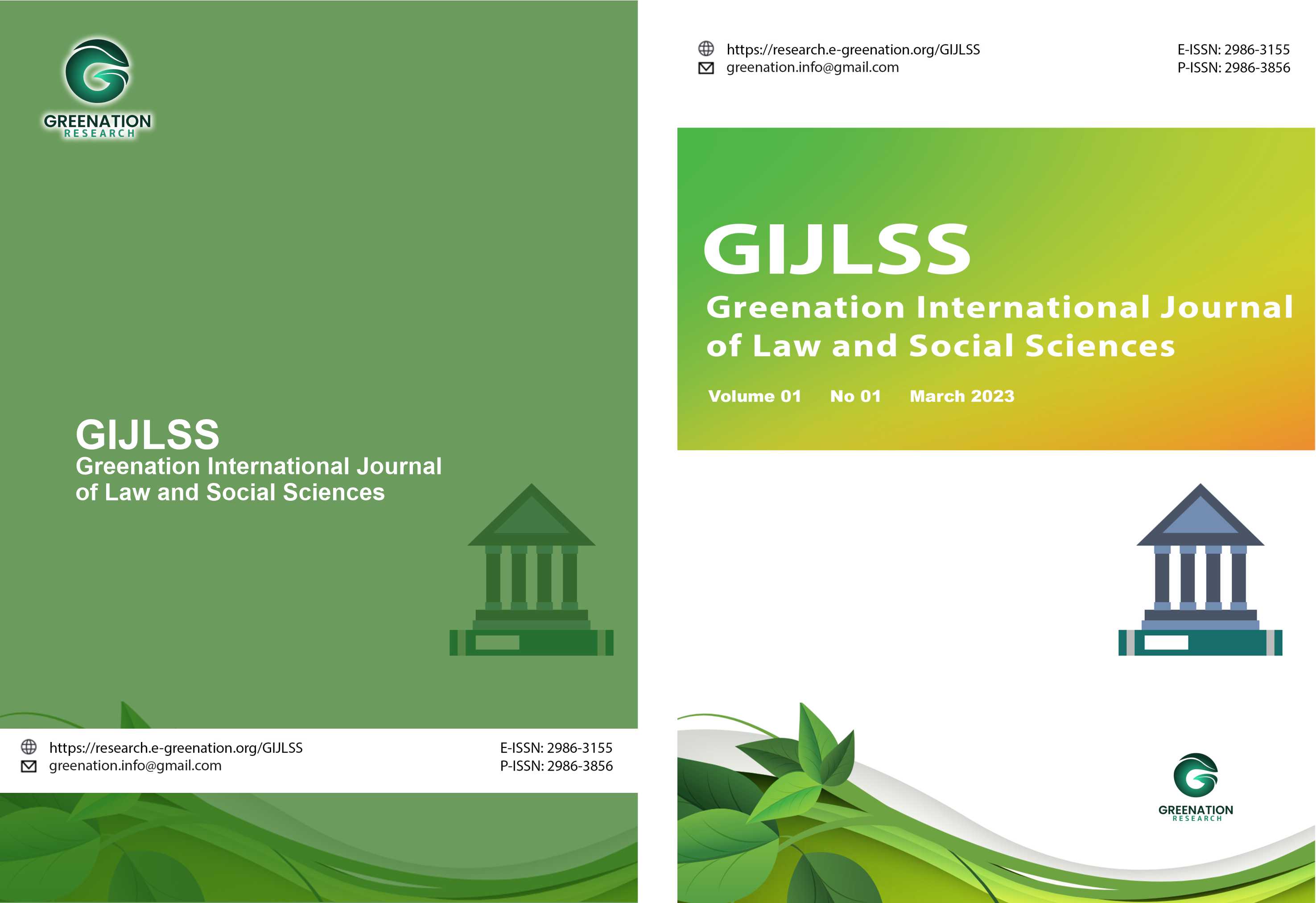The Concept of Terrorism in Indonesia and Malaysia
DOI:
https://doi.org/10.38035/gijlss.v2i4.284Keywords:
Existence, Prevention, Eradication of TerrorismAbstract
The purpose of analyzing the concept of terrorism in Indonesia and Malaysia. This study is a normative legal study, to determine the differences and similarities between the legal systems of one country and another. Comparison of Indonesia and Malaysia. Application of the Concept of Terrorism in Positive Law Indonesia as we know that the Criminal Code (KUHP) has not specifically regulated and is not adequate enough to eradicate Criminal Acts of Terrorism, the Indonesian Government feels the need to form a Law on the Eradication of Criminal Acts of Terrorism, namely by compiling a Government Regulation in Lieu of Law (Perpu) number 1 of 2002, which on April 4, 2003 was ratified into Law number 15 of 2003 concerning the Eradication of Criminal Acts of Terrorism. Finally, with the issuance of Law Number 9 of 2013 concerning the Prevention and Eradication of Criminal Acts of Terrorism Funding, Indonesia positions itself as a country that participates internationally in efforts to eradicate terrorism funding. Meanwhile, the Implementation of the Concept of Terrorism in Malaysian Law is contained in the Internal Security Act of Malaysia or the Domestic Security Act, which is an act created by the Malaysian Parliament that applies in West Malaysia and East Malaysia. The Domestic Security Act of 1960 (Act 82), better known as the ISA, aims to prevent threatening actions by a substantial group of people, both from within and outside Malaysia. The definition of a terrorist contained in the Preliminary Internal Security Act of Malaysia, Interpretation section, refers more to individuals who are personally involved in acts of terrorism. The definition of a terrorist in the ISA is preferred because acts of terrorism can be carried out by individuals, groups of people or countries as an alternative to openly declaring war. Then, from that definition, further steps can be taken in an effort to protect domestic security, public order and eradicate terrorism, this is the basis for the TNI to be involved.
References
Agus SB. 2014. Darurat Terorisme Kebijakan Pencegahan, Perlindungan dan Deradikalisasi, Daulatpress: Jakarta. 306
Deradikalisasi Dunia Maya Mencegah Simbiosis Terorisme dan Media, Daulatpress: Jakarta.
Ahmad Jainuri. 2016. Radikalisme dan Terorisme Akar Ideoogi dan Tuntutan Aksi, Intran Publishing: Malang.
Azyumardi Dkk. 2017. Reformulasi Ajaran Islam, Mizan Media Utama: Bandung.
C. Hakim. 2011. Pertahanan Indonesia; Angkatan Perang Negara Kepulauan, Red & White Publishing: Jakarta.
Connie Rahakundini Bakrie. 2007. Pertahanan Negara dan Postur TNI Ideal, Yayasan Obor: Jakarta.
Erdianto Effendi. 2015. Penanggulangan Separatisme Dengan Menggunakan Hukum Pidana, Genta Publishing: Yogyakarta.
Erwin. 2010. Jejak Sejarah Teror di Indonesia, PT. Intimedia CiptaNusantara: Jakarta.
Hans Kelsen. 2010. Teori Umum Tentang Hukum dan Negara, Nusa Media: Bandung.
Irfan Idris. 2017. Membumikan Deradikalisasi, Daulatpress: Jakarta.
Ismantoro Dwi Yuwono. 2012. Kupas tuntas Intelijen Negara dari A sampai Z. Cetakan Pertama: Jakarta.
Jawahir Thantowi. 2013. Terorisme Negara Kerjasama Konspiratif Menjinakan Islam Fundamentalis, UII Press: Yogyakarta.
Jazim Hamidi. Dkk. 2009. Teori dan Politik Hukum Tata Negara, Total Media: Yogyakarta.
Jeanne Darc Noviayanti Manik. 2007. Tindak Pidana Terorisme, Equality, Vol. 12 No. 2 Agustus. 309 Jeanne N.Knutson, ed. 1973. Handbook of Political Psychology, JosseyBass: San Francisco.
Jimly Assiddiqie, 2007. Pokok-Pokok Hukum Tata Negara Indonesia Pasca Reformasi, PT Bhuana Ilmu Populer: Jakarta.
Ma’aruf Amin. 2013. Mengenal dan Mewaspadai Penyimpangan Syi’ah di Indonesia, Al Qalam: Jakarta. Mahfud MD. 1998. Politik Hukum di Indonesia, LP3ES & UII Press: Yogyakarta.
Mahsryur Effendi. 2007. HAM dalam Dimensi/Dinamika Yuridis, Sosial, Politik, dan Proses Penyusunan/Aplikasi Ha-Kham (Hukum Hak Asasi Manusia) dalam masyarakat, Bogor, Ghalia Indonesia: Bogor.
Majda El Muhtaj. 2008. Dimensi-Dimensi HAM Mengurai Hak Ekonomi, Sosial, dan Budaya, Rajawali Pers: Jakarta.
Muladi. 2009. Hak Asasi Manusia Hakekat, Konsep dan Implikasinya dalam Perspektif Hukum dan Masyarakat, Refika Aditama: Bandung.
Muradi. 2007. Polri dan RUU Keamanan Nasional, wordpress.com.
Sirajudin, dkk. 2008. Legislative Drafting (Pelembagaan metode partisipatif dalam pembentukan Peraturan Perundang-Undangan), In Trans Publishing: Malang.
Slamet Singgih. 2014. Intelijen Catatan Harian Seorang Serdadu, Kata Hasta Pustaka: Jakarta.
Soeharto. 2009. Implemetasi Perlindungan Hak Tersangka, Terdakwa dan Korban dalam Undang-Undang Nomor 15 Tahun 2003 tentang Pemberantasan Tindak Pidana Terorisme, Disertasai Program Pascasarjana Universitas Padjadjaran: Bandung.
Sukawarsini Djelantik. 2010. Terorisme Tinjauan Psiko-Politis. Peran Media, Kemiskinan, dan Keamanan Nasional, Yayasan Obor Indonesia: Jakarta.
Syamsul Maarif. 2011. Militer Dalam Parlemen 1960-2004, Prenada: Jakarta.
Downloads
Published
How to Cite
Issue
Section
License
Copyright (c) 2024 Imam Syafei, Marwan

This work is licensed under a Creative Commons Attribution 4.0 International License.
Copyright :
Authors who publish their manuscripts in this journal agree to the following conditions:
- Copyright in each article belongs to the author.
- The author acknowledges that the Greenation International Journal of Law and Social Sciences (GIJLSS) has the right to be the first to publish under a Creative Commons Attribution 4.0 International license (Attribution 4.0 International CC BY 4.0).
- Authors can submit articles separately, arrange the non-exclusive distribution of manuscripts that have been published in this journal to other versions (for example, sent to the author's institutional repository, publication in a book, etc.), by acknowledging that the manuscript has been published for the first time at GIJLSS.























